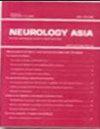影响中国西部 168 例重症肌无力患者健康相关生活质量的因素:疾病严重程度、社会支持和应对方式
IF 0.2
4区 医学
Q4 CLINICAL NEUROLOGY
引用次数: 0
摘要
背景:重症肌无力(MG)与健康相关的生活质量(HRQOL)降低有关。本研究旨在调查影响中国西部肌无力患者 HRQOL 的因素。研究方法168名患者填写了一系列问卷,以评估HRQOL与社会支持和应对方式之间的关系。我们还评估了临床特征对 HRQOL 的贡献。通过单因素方差分析(ANOVA)、相关分析和回归分析来确定对 MG 患者 HRQOL 有负面影响的预测因素。结果显示不同疾病费用与每月收入之比(F = 5.831,P = 0.001)和 MG 症状频率(F = 9.128,P < 0.001)的患者在 HRQOL 评分上存在明显差异。斯皮尔曼相关分析表明,HRQOL 的降低与重症肌无力综合评分(r = 0.461,P < 0.001)、对抗(r = 0.312,P < 0.001)和接受-顺从应对方式(r = 0.433,P < 0.001)的相关性较低。逐步回归分析进一步显示,接受-辞职应对方式(β = 0.380,P < 0.001)和 MGC 评分(β = 0.322,P < 0.001)是预测 HRQOL 的主要因素。结论:我们的研究揭示了影响 HRQOL 的因素:我们的研究揭示了影响 MG 患者 HRQOL 的因素,并首次证明接受-辞职是除疾病严重程度外影响 MG 患者 HRQOL 差异的主要独立预测因素。本文章由计算机程序翻译,如有差异,请以英文原文为准。
Factors that impact health-related quality of life in 168 myasthenia gravis in West China: Disease severity, social support, and coping style
Background: Myasthenia gravis (MG) is associated with reduced health-related quality of life (HRQOL). This study aimed to investigate factors that impact HRQOL in MG in a patient population in West China. Methods: A series of questionnaires were completed by 168 patients to assess the relationships between HRQOL and social support and coping style. We also evaluated the contributions of clinical characteristics to HRQOL. One-way analysis of variance (ANOVA), correlation and regression analysis were conducted to identify predictors that negatively impact HRQOL in MG. Results: There were significant differences in HRQOL scores among patients with different ratio of disease cost to income each month (F = 5.831, P = 0.001) and frequency of MG symptoms (F = 9.128, P < 0.001). Spearman’s correlation analysis showed that reduced HRQOL had low correlation with Myasthenia Gravis Composite score (r = 0.461, P < 0.001), confrontation (r = 0.312, P < 0.001) and acceptance- resignation coping style (r = 0.433, P < 0.001). Stepwise regression analysis further revealed that acceptance-resignation coping style (β = 0.380, P < 0.001) and MGC score (β = 0.322, P < 0.001) were the main predictors of HRQOL. Conclusions: Our study revealed the factors that impact HRQOL in MG patients and provided the first demonstration that acceptance-resignation is the main independent predictor of poor HRQOL in MG, other than disease severity.
求助全文
通过发布文献求助,成功后即可免费获取论文全文。
去求助
来源期刊

Neurology Asia
CLINICAL NEUROLOGY-
CiteScore
0.30
自引率
0.00%
发文量
76
审稿时长
>0 weeks
期刊介绍:
Neurology Asia (ISSN 1823-6138), previously known as Neurological Journal of South East Asia (ISSN 1394-780X), is the official journal of the ASEAN Neurological Association (ASNA), Asian & Oceanian Association of Neurology (AOAN), and the Asian & Oceanian Child Neurology Association. The primary purpose is to publish the results of study and research in neurology, with emphasis to neurological diseases occurring primarily in Asia, aspects of the diseases peculiar to Asia, and practices of neurology in Asia (Asian neurology).
 求助内容:
求助内容: 应助结果提醒方式:
应助结果提醒方式:


